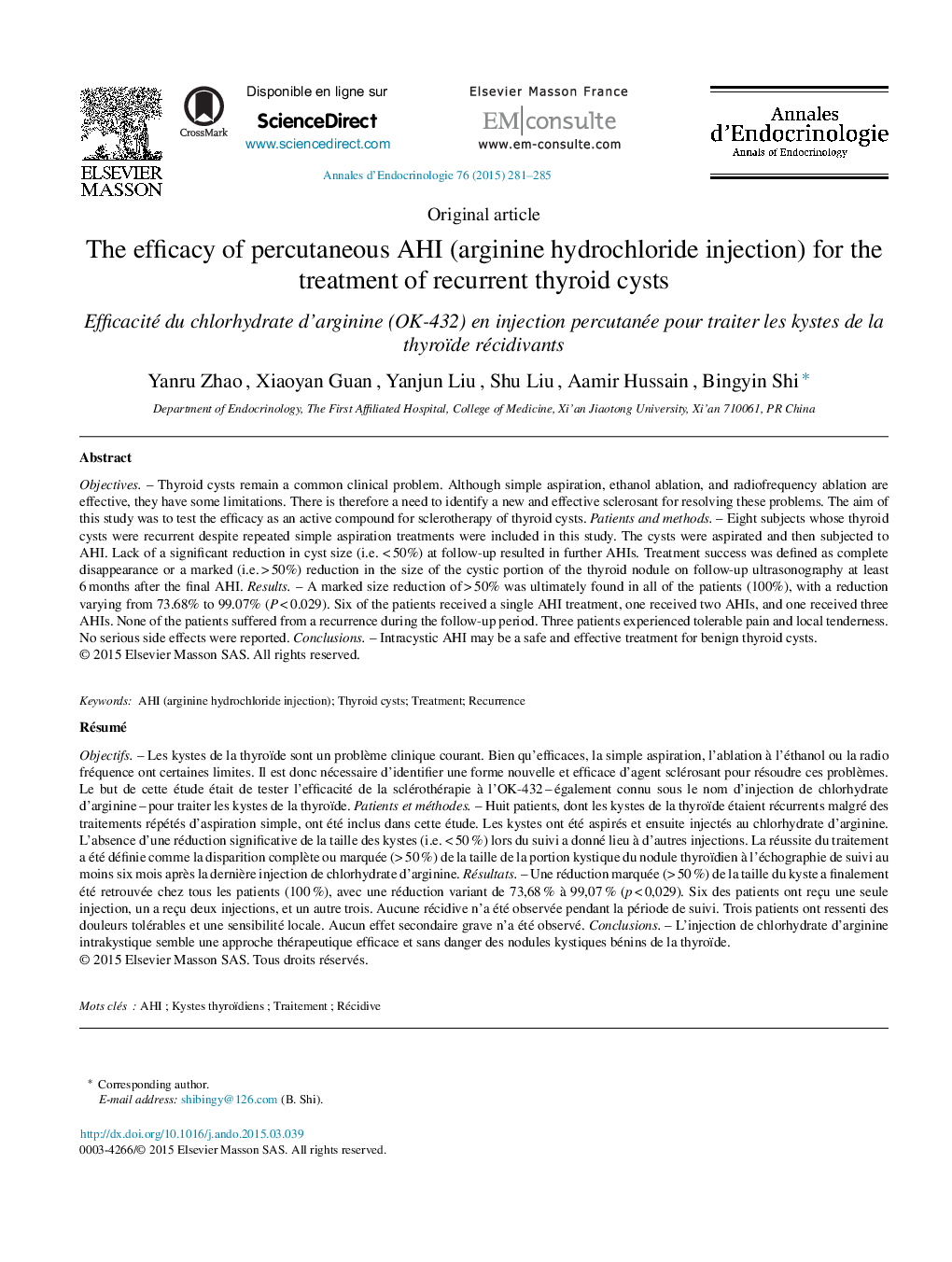| کد مقاله | کد نشریه | سال انتشار | مقاله انگلیسی | نسخه تمام متن |
|---|---|---|---|---|
| 6086044 | 1207053 | 2015 | 5 صفحه PDF | دانلود رایگان |

ObjectivesThyroid cysts remain a common clinical problem. Although simple aspiration, ethanol ablation, and radiofrequency ablation are effective, they have some limitations. There is therefore a need to identify a new and effective sclerosant for resolving these problems. The aim of this study was to test the efficacy as an active compound for sclerotherapy of thyroid cysts.Patients and methodsEight subjects whose thyroid cysts were recurrent despite repeated simple aspiration treatments were included in this study. The cysts were aspirated and then subjected to AHI. Lack of a significant reduction in cyst size (i.e. < 50%) at follow-up resulted in further AHIs. Treatment success was defined as complete disappearance or a marked (i.e. > 50%) reduction in the size of the cystic portion of the thyroid nodule on follow-up ultrasonography at least 6 months after the final AHI.ResultsA marked size reduction of > 50% was ultimately found in all of the patients (100%), with a reduction varying from 73.68% to 99.07% (P < 0.029). Six of the patients received a single AHI treatment, one received two AHIs, and one received three AHIs. None of the patients suffered from a recurrence during the follow-up period. Three patients experienced tolerable pain and local tenderness. No serious side effects were reported.ConclusionsIntracystic AHI may be a safe and effective treatment for benign thyroid cysts.
RésuméObjectifsLes kystes de la thyroïde sont un problème clinique courant. Bien qu'efficaces, la simple aspiration, l'ablation à l'éthanol ou la radio fréquence ont certaines limites. Il est donc nécessaire d'identifier une forme nouvelle et efficace d'agent sclérosant pour résoudre ces problèmes. Le but de cette étude était de tester l'efficacité de la sclérothérapie à l'OK-432 - également connu sous le nom d'injection de chlorhydrate d'arginine - pour traiter les kystes de la thyroïde.Patients et méthodesHuit patients, dont les kystes de la thyroïde étaient récurrents malgré des traitements répétés d'aspiration simple, ont été inclus dans cette étude. Les kystes ont été aspirés et ensuite injectés au chlorhydrate d'arginine. L'absence d'une réduction significative de la taille des kystes (i.e. < 50 %) lors du suivi a donné lieu à d'autres injections. La réussite du traitement a été définie comme la disparition complète ou marquée (> 50 %) de la taille de la portion kystique du nodule thyroïdien à l'échographie de suivi au moins six mois après la dernière injection de chlorhydrate d'arginine.RésultatsUne réduction marquée (> 50 %) de la taille du kyste a finalement été retrouvée chez tous les patients (100 %), avec une réduction variant de 73,68 % à 99,07 % (p < 0,029). Six des patients ont reçu une seule injection, un a reçu deux injections, et un autre trois. Aucune récidive n'a été observée pendant la période de suivi. Trois patients ont ressenti des douleurs tolérables et une sensibilité locale. Aucun effet secondaire grave n'a été observé.ConclusionsL'injection de chlorhydrate d'arginine intrakystique semble une approche thérapeutique efficace et sans danger des nodules kystiques bénins de la thyroïde.
Journal: Annales d'Endocrinologie - Volume 76, Issue 3, July 2015, Pages 281-285